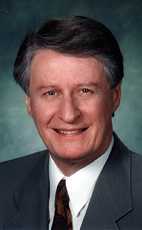Mr. Speaker, it is a privilege and an honour this morning to be able to speak about revoking the conviction of Louis David Riel for high treason and restoring his memory here in this House.
I listened to the speech of my colleague, the hon. member for Rimouski-Témiscouata, who has, in my view, done a good job of laying out for us the life-I was going to say the work-of Louis Riel. I have also just listened to the speech of my Liberal colleague, who, in his turn, has emphasized the important human qualities shown by Louis Riel during his unfortunately all too brief existence.
But, at the same time, I cannot but deplore the fact that the member who should perhaps, of all the members in this House, have the greatest interest in this subject, the member from Manitoba, has not taken the lead in supporting the bill before us with more vigour, resolve and determination.
What is this bill about? I think it would be appropriate at this time to reread it for the benefit of the House and also for the benefit of viewers. This is a bill to revoke the conviction of Louis David Riel.
Louis David Riel, it should be remembered, was a member of the House of Commons for the electoral district of Provencher from 1873 to 1874. He was convicted of high treason on August 1, 1885, sentenced to death, and hanged on November 16, 1885 at Regina, then part of the North West Territories.
The second whereas recalls that, notwithstanding his conviction, Louis David Riel has become a symbol and a hero to successive generations of Canadians who have, through their governments, honoured and commemorated him in specific projects and actions. Finally, the third whereas of this bill points out quite rightly that it is consistent with this recognition that the conviction of Louis David Riel be now revoked.
The bill would therefore have Her Majesty, by and with the advice and consent of the other Chamber and of this Chamber, revoke the conviction of Louis David Riel for the offence of high treason, while recognizing that nothing in this Act shall be construed as limiting or reflecting in any manner Her Majesty's royal prerogative of mercy or the Letters Patent Constituting the Office of Governor General relating to pardons.
This is not, as you know, the first time this subject has been raised in the House. I would like to point out that, on November 28, 1985, the Liberal member for Hamilton East asked the Conservative government of the day, through the Speaker of this House, to exonerate the victim of the conspiracy of another Conservative government, that victim of course being Louis Riel.
That hon. member, who is still sitting in this House, more or less committed herself in 1985 to supporting the pardon of Louis Riel. Now once again she has the opportunity of putting her good intentions of 11 years ago into deeds. I trust that, even if her seat is not on the line, this time, she will follow up on it.
Just to show how important this case is, and how often it has been brought up in the House, as well as to stress the point that this ought to be the very last time it is brought up in the House-and the only way that can happen is if this bill is passed-may I point out that, in the past, many other people in the House have shared the same concern we have today.
On September 23, 1983, William Yurko, who was then the member for Edmonton East, introduced a bill to grant a pardon to Louis Riel. That bill was not followed up on. He tried again on March 14, 1984.
On June 28, 1984, Les Benjamin, the NDP member for Regina-Lumsdon, called for the conviction of Louis David Riel to be revoked.
On December 13, 1984, Mr. Benjamin tried again, followed on September 16, 1987 by another NDP member who is still among us, the hon. member for Kamloops, who again introduced a bill to revoke the conviction of Louis Riel.
Today we have a bill introduced on November 16, 1994, and here we are nearly two years later. The hon. member for Rimouski-Témiscouata is now proposing a bill to revoke the convicition of Louis Riel.
Louis Riel was a great man in his day, a man of conviction, a humanist. He held a vision, not only for the Métis people, but for all Canadians from sea to sea. It seems that he was not given the attention he deserved. The tenor of the times precipitated events, and trapped him in a process which, as others have already said, was a mistake on all sides but not, most certainly, an act of treason. What took place was an error.
On many occasions over many years, the governments of all of the provinces have examined this issue. Many have adopted resolutions or motions aimed at his rehabilitation. But this House has not yet done what must be done. We find ourselves today with an opportunity to finally correct the course of history.
I trust that the member from Manitoba who referred just now to letting some time pass will instead pick up the torch and be the first to lead all of us in the House to rehabilitate the memory of Louis David Riel.

